Or, the follies of trying to cram a huge data analysis project into your vanishingly sparse amount of free time.
Okay. This isn’t the first time this has happened, but it should be the last.
Back when I started this ill-considered endeavour, right in the initial post, I mentioned that there will almost definitely be mistakes within the figures mentioned. All the data is taken from the (magnificent) BBC Genome project, most of which is taken from OCR-scanned issues of the Radio Times, and is therefore hostage to the limitations of both OCR software and the formatting quirks of the RT during any given period. That’s all fine when listings are picked up correctly by the BBC’s Genome Robot Army:

It’s a bit less fine during spells where the Radio Times uses a different layout to express daytime listings:

But: not to fret! I could just ignore these inconvenient listings, because almost-correct is better than nothing, right? Initially, that’s how I felt. Nobody has ever seemed to try doing something like this before, after all. There’s almost a million individual programme listings to calculate, nobody could reasonably expect it to be 100% correct.
Except, y’know, it would bug the merry bloody hell out of me knowing there’s a 1988-sized gap in a programme’s data due to the way things were formatted at the time. The data is all thereabouts, ripe for the plucking. The only issue is: how to avoid the thorny bits (i.e. the thousands of instances where programme titles are only mentioned within programme descriptions)? How could I get around this, and get it all as accurate as possible? Individual episodes might squeeze through my big ol’ data net, but at least I can try to avoid any great big gaping holes. Somehow.

So: what I went and did (warning: anyone who doesn’t give a flying fart about Excel can skip to the Natalie Portman meme below) was add in a column which contains a combined YEAR plus WEEKNUM in each cell, throw the whole dataset for each programme into a pivot table, and show =YEAR&”w”&WEEKNUM down the pivot’s vertical axis, then WEEKDAY along the horizontal axis. Any conspicuous gaps would be highlighted, then I can go digging for missing listings. Once I know which date ranges are missing, pull out Genome data for those weeks, and (using a really bloody bitty process involving Notepad++ and Excel filters) extract individual programme details within programme strands, all for the express purpose of seeing how often Jimbo and the Jet Set really got shown on BBCs One and Two (not as often as you might think, just 238 times, putting Jimbo into joint-489th place alongside Diddy Dick and Dom).
It was a right royal pain in the arse, but OH THE IMPROVED ACCURACY OF IT ALL. I could finally sleep at night. Okay, I still couldn’t, but that’s because I’d been up until 2am staring at Excel on an overly bright monitor messing with all the data.

It wasn’t going to be perfect, but before publishing the entries for each programme, I’d do a more thorough check of each broadcast total. What’s the worst that could happen? Just before I click ‘publish’ on the entry for Grandstand, I might notice a gap, examine the missing dates and uncover another 27 episodes erroneously mis-scanned as ‘Grandsland’? It’ll only ever push it up the list a bit, I might need to write about the next programme instead, and have to publish the entry for Grandstand a bit later, but that’s fine.
Hey, it’s not like an entry is suddenly going to have far fewer entries than I’d anticipated, is it?

Hi, people who don’t care about Excel – welcome back. Here’s what you’ve missed: I’ve gone and been a bit too clever for my own good and bollocksed up. A bit.
Basically, in noticing a large gap for One Particular Programme, I used trickery to fill in the gaps (and seriously, the alternative would’ve been filling in several hundred missing programmes manually, which I’ve already had to do too many times in this list), and things accidentally got duplicated. In short: I pulled a load of missing data through twice, and my checks to detect duplicates were thwarted by one set of data erroneously being listed as on BBC1 (gah, morning weekdays kids shows had moved to BBC2 at the time, as Daytime UK had started on BBC1 by then).
In short: an entry was suddenly going to have far fewer entries than I’d anticipated. Which is a bit of a nuisance, as the Programme In Question was about to appear at Number 10 on the list. And now, on checking through the data, correcting the episode count and recompiling the list: it was actually in just 16th place on the list.
Well, damn. That kind of undercuts my sense of satisfaction at finally reaching number ten on the rundown.
I could’ve tried to save face and just gone with my initial, incorrect, episode count, just pretending everything was fine. But: nah, not going to do that. SO: the programmes that I’d initially placed as such:
16: Match of the Day (Shown 4055 times, 1964-2021)
15: Doctors (Shown 4081 times, 2000-2021)
14: Escape to the Country (Shown 4365 times, 2002-2021)
13: Grandstand (Shown 4500 times, 1958-2007)
12: Flog It! (Shown 4530 times, 2002-2021)
11: Jackanory (Shown 4701 times, 1965-2009)
Are actually in the following positions:
15: Match of the Day (Shown 4055 times, 1964-2021)
14: Doctors (Shown 4081 times, 2000-2021)
13: Escape to the Country (Shown 4365 times, 2002-2021)
12: Grandstand (Shown 4500 times, 1958-2007)
11: Flog It! (Shown 4530 times, 2002-2021)
10: Jackanory (Shown 4701 times, 1965-2009)
Dampens the impact of starting to announce the Top Ten, but fitting given the unique blend of intricate detail and rank amateurism you’d expect from my blog. If nothing else, I’m committed to meeting your expectations of this place. I’d have done it properly if I was being paid for this, honest.
So, what’s in sixteenth place? Well, you may have already guessed given the illustrative images I used near the start of this entry. It’s…
16: Playdays (née Playbus)
(Shown 3908 times, 1988-2002)
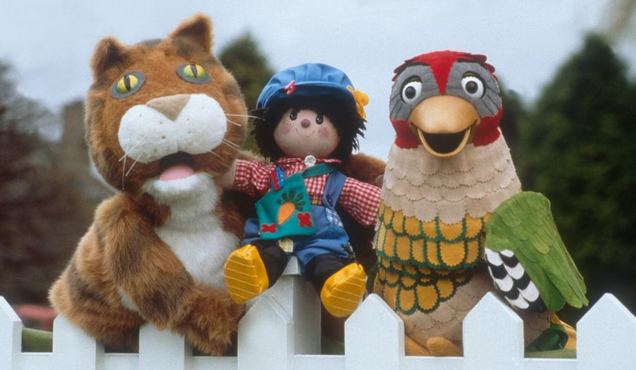
As time marches on, it’s increasingly easy to stumble across things that make you feel old. It can be cultural references that wholly pre-date the births of work colleagues (“sorry, what’s Ceefax?”), it can be seeing someone you went to school with on Facebook (“Nah, that must be someone middle-aged with a similar name who just looks a bit like them. Oh. Damn.”), but for me it was being raised on a diet of Humpty, Little Ted and The Round Window and subsequently seeing people banging on about The Why Bird. I felt alienated, a little afraid and out of touch with popular culture. Which is a bit of a wake up call when you’ve not yet reached puberty.
At the time, Play School had been a preschool colossus. On the air since morning one of BBC2, it was the favourite of many a child. Me included.
The big announcement that Play School was going through the exit window came on 5 October 1988. The programme that (due to circumstances) launched BBC-2 would be no more, and in its place would be something a little more up-to-date for the modern audience.
However, before getting a chance to win over the key audience of two- to five-year-olds, it would first have to win the support of Britain’s parents, many of whom would have been grown up under the benevolent glow of the Play School house. A sense of continuity was to be instilled by way of former Play School producer Cynthia Felgate, who’d be sitting at the controls of the new tyke-friendly offering.
The keys to Playbus were modernisation, new characters and a fresh sense of energy. No more Big Ted, no more cuckoo, and no more peering through windows. In came a programme designed to feel less middle-class, less cosy, and more urban.
It was a gutsy move by the Children’s Department of the BBC, given the lack of threat to their loyal audience at the time. Channel 4 had all but given up on TV for younger children – the likes of Chips Comic had long fallen out of favour, and Pob’s Programme was in the middle of the five-year gap between its two series. Unless your younglings were weird enough to enjoy Murun Buchstansangur, the fourth network had little to offer them. ITV was still bothering with pre-school programming at lunchtime, but word in the press was that groups within the broadcaster would rather be using the slot for something more commercial.
It’s quite likely the BBC was concerned about a different threat being beamed down from the skies. Satellite service BSB was readying itself for a launch, and despite having abandoned plans for a standalone kids channel at that point, were planning on handing a generous amount of airtime to children’s programming into their Galaxy entertainment channel. Ultimately, their modest subscriber base would pose little threat to Auntie Beeb, and it would be eaten up by a rival satellite service content to serve up imported cartoons (and DJ Kat) instead, but that future wasn’t on display in the Beeb’s crystal ball. As it turned out, Play School was still the biggest draw in the playground at the time, and it would likely have thrived had it been left alone. But hey, never hurts to have a bit of a refresh.
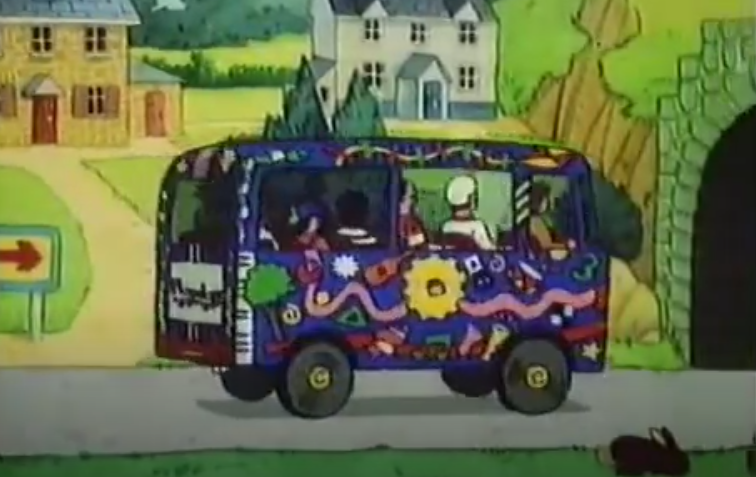
So, Play School was to be knocked down to provide a clear road ahead for Playbus. And so, from 6 October 1988, the final few repeat episodes of Play School (the last of the new episodes having aired in March that year) were to be followed by five minute taster episodes of its successor, listed as ‘Playbus is Coming‘. Set to start on Monday 17 October 1988, this was the bright new future. Albeit one followed in the schedules by repeats of Arthur Negus Enjoys.
The initial reaction was (and if any of this is a surprise to you: welcome to Britain) a general sense of despair at the very concept of change. Predictably enough, the Daily Mail were one of the first in line to spit the dummy over the change, with a full report and review from a group of disappointed critics. “Their bored little faces say it all,” it trilled. “Especially the mouth parts of their faces”, it should have continued, except they probably hadn’t heard of Jack Handey.
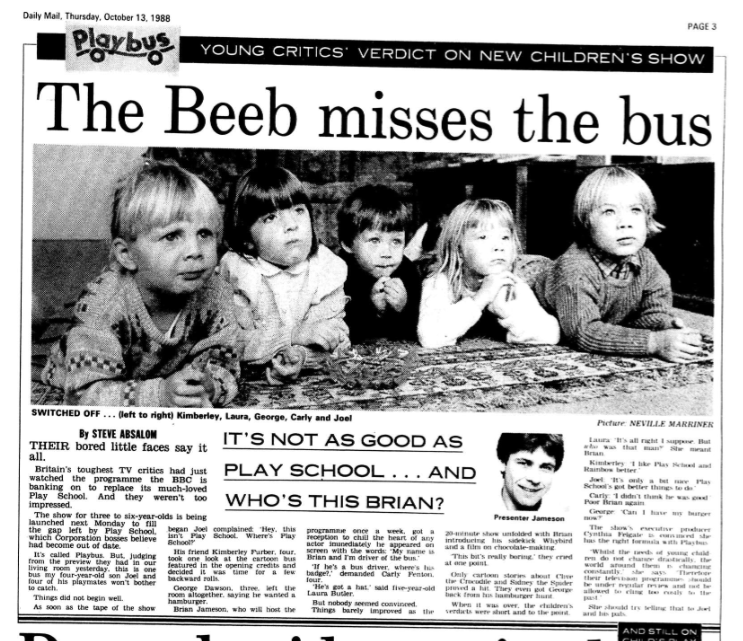
Despite a sceptical press, Playbus steadily built up a following. Children’s BBC was arguably at its peak around that time, with the corporation pumping £20m per year into the Children’s Programmes department, which resulted in approximately 900 hours of kid-focused programming per annum. That included prestige drama serials such as Tom’s Midnight Garden or The Chronicles of Narnia, the latter attracting audiences north of 10 million, but the less heralded programmes were no less impressive. From the winsome whimsy of Chucklevision, to educational fare like The Really Wild Show, to serious documentary strand The Lowdown, there was generally something for every taste. With some at ITV still grouching about the cost-ineffectiveness of producing Children’s ITV – especially with a costly franchise round looming in 1992 – the BBC was the best place for young viewers could to get that level of diversity.
As it was, Playdays would follow the Play School template in many ways. Going out in a familiar slot each weekday, carrying an understanding that the audience would be travelling with them each day. And at least this time, the weekly ride would provide a bit more variety each day than Play School had offered.
Mondays would be the Why Bird Stop, with the titular fowl dispensing various pellets of knowledge to the viewer. Tuesdays would provide a visit to the Playground Stop, where relatable footage of real children could be seen. Wednesdays would feature the Dot Stop, where the titular Dot (Rebecca Higgins) would offer sun with music and numbers. Thursdays would result in a visit to the Patch Stop, where nature and the environment would be on show. Fridays would seek to instil a sense of wonder and imagination in the viewers, with a trip to the Tent Stop.
Each stop would have its own presenter and characters, and often attempt to tie in to seasonal or topical events (sadly not in the sense of Histor’s Eye, more along the lines of “let’s make some Easter stuff”). This concerted effort may have suggested a lack of faith in any one strand, and I can’t help but suspect the audiences attention may have flagged during the less popular stops. But, it did at least offer some scope for the individual ‘stops’ to evolve, so in 1992 the Dot Stop became the Roundabout Stop, offering puzzles, games and a dash of magic. Similarly, the Tent Stop would be replaced with the Poppy Stop, where a visit was made to Poppy the Cat’s house, allowing for cameo appearances from other characters from the series.
Strangely, considering it was part of the televisual upbringing for children for fourteen years, Playdays (as it was for most of its run, the title changing from Playbus from Christmas Day 1989 following a complaint from the National Playbus Association) doesn’t seem to be imprinted anywhere near as prominently on Britain’s cultural wallpaper as Play School, or successor show Teletubbies. Maybe the stripped approach to those daily editions prevented it sticking to the national psyche in the way those other shows did? Maybe, for all the talk of appealing to a more modern audience, adopting a completely different approach (as Teletubbies would provide) might have been a better idea? Or maybe it was just one of TV’s great palate cleansers, a fourteen-year fade between the way Things Used To Be, and The Way Things Would Be?
Don’t get me wrong, it was definitely doing something right – it clocked up almost 4000 showings on the main BBC channels during that tenure, but it seems relatively little of it remains in our collective consciousness. Maybe it just aired to a generation that would grow up less desperate to revisit the cultural ephemera of their youth? Admittedly, I’m just outside of the generation likely to have their names trip off the tongue, but to my mind the roster of Playdays presenters – the most notable of which were Zoe Ball and Dave Benson Phillips – doesn’t seem as memorable as that of Play School. I mean, yes, Zoe Ball is hosting one of Britain’s most popular radio programmes these days, but Floella Benjamin is a bloody Baroness, so checkmate.

Not that Playdays didn’t make a bit of dough for BBC Enterprises. At the time there were lots of opportunities to bask in Playdays-related paraphernalia, with straight-to-retail VHS tapes aplenty, hardcover annuals, a long-running magazine, most of which being spin-off opportunities Play School left the stage too early for. Plus, there was a spin-off educational videogame that got on the cover of Your Sinclair.
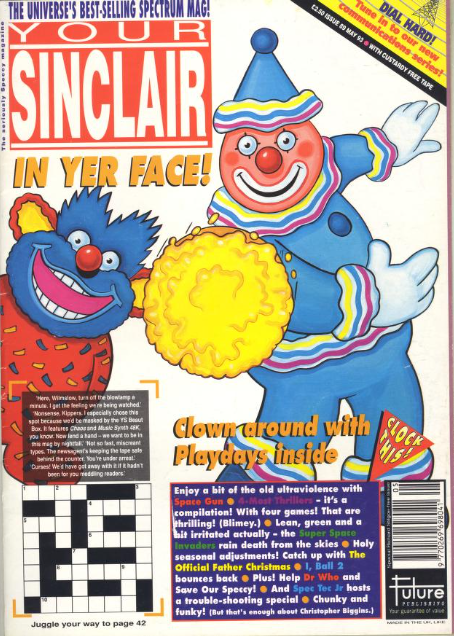
Playdays also displayed an impressive staying power. Despite no new episodes being made after 1997, the programme would continue to air on BBC channels, even after Teletubbies became a phenomenon both national and international, with the latter airing in the mornings on BBC2 (often twice per morning, such was it’s popularity), while repeat episodes of Playdays kicked off each afternoon’s CBBC strand on BBC1. By 2000, it was the repeats of Playdays that were deemed popular (or cheap) enough to be screened twice per weekday, in an early morning slot and at lunchtime. However, by 2002 BBC2 had the fresh-faced Tweenies to enrapture an audience of potty-enthusiasts, and Playdays was shuffled over to the digital-only CBeebies channel for a couple of years.
After that, it was gone from our screens forever. At least for those without the foresight to stock up on Playdays VHS releases beforehand. For those who did… it was just a matter of waiting until 2023, and PAYDIRT. For everyone else: bye, Why Bird.
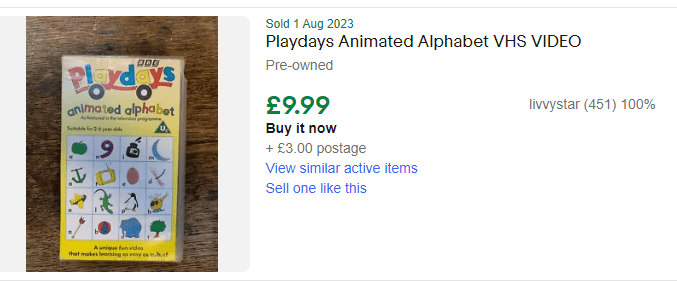
FACTS AMAZING: the day of the first ever episode (Monday 17 October 1988) also saw the debut of forgotten Brian Wilde vehicle Wyatt’s Watchdogs. That was that generation’s Barbie versus Oppenheimer.


(With thanks to Paul R Jackson for detail on the last few months of Play School being repeat episodes, and the detail of the final ‘new’ episodes having aired in March 1988.)
There, another one down, albeit in completely inconvenient circumstances. Next time: we go inside number nine.


5 responses to “DAMN, BALLS AND BLAST (the 100 Most-Broadcast BBC Programmes Of All Time, number, erm, 16).”
My much less scientific list had Playdays much further down the rankings, at #25, so it’s a relief to know that I was only nine places out rather than 15! (Annoyingly, I forgot to add in the figures for “Playbus”, which makes up for some of the discrepancy, but not a lot.)
LikeLiked by 1 person
This seems a good place to flag that, according to their data tables, Grandstand has 4561 entries in total (not 4500 as listed above), while Flog It has only 4477 (not 4530). Which if correct would also swap their positions.
LikeLike
Hmm. It’s easily possible that my figures don’t quite match, especially with all the variants of Grandstand (from the obvious likes of World Cup Grandstand to 1968’s weirdly specific ‘Thursday Grandstand’), it’s likely there are some my data-trawl didn’t pick up. Possibly not flagged as ‘Grandstand’ in the RT headline programme listing, perhaps? Similarly, it’s very possible a number of Flog It! episodes were scheduled but not aired due to breaking news (or just generally having something better to broadcast). Though I have just found one curious typo on Genome – Wed 13th Apr 2005, 15:30, where the scanning software has it as a programme called ‘Dog It!’: https://genome.ch.bbc.co.uk/521fea4f56274b59a28d960c253e76b0
LikeLike
[…] Playdays(Shown 3908 times, […]
LikeLike
[…] the new totem for under-fives: initially called Playbus (later Playdays), which would go on to have quite an impressive run of it’s own. And so, between March and October 1988, a variety of Play School episodes were repeated while […]
LikeLike